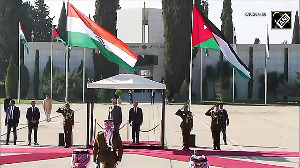In the midst of the controversy over the success of the 1998 thermonuclear test, nuclear scientist P K Iyengar has said the views of former Defence Research and Development Organisation scientist K Santhanam on the issue are the 'clincher'.
There is a "strong reason to believe that the thermonuclear device had not fully burnt and, therefore, further testing was called for," Iyengar, a former Atomic Energy Commission chairman, said in a statement on Thursday.
He rejected the statement attributed to him by the government's Principal Scientific Advisor R Chidambaram on the outcome of the 1998 thermonulcear test, saying he was 'misquoted' by him on something he had written in 2000.
He said Chidambaram had "tried to imply that I am in agreement with the official number for the yield of the thermonuclear test of 45 kilotons and that I, therefore, also agree that the thermonuclear device was a success".
Iyengar clarified, "This is not correct. What I wrote in a newspaper article published in August 2000 was that if one goes by the numbers for the total nuclear yield put out by the Department of Atomic Energy, which I see no reason to dispute, the yield of the thermonuclear device detonated on May 11, 1998, was around 40 kilotons. This is a rather low yield."
"The crux of that article was that even if one were to accept without question the DAE yield of 40 kilotons, there is a strong reason to believe that the thermonuclear device had not fully succeeded," Iyengar said. Terming the test as 'fully successful', AEC Chairman Anil Kakodkar and Chidambaram had on Thursday said the controversy triggered by Santhanam, was 'unnecessary'.
Iyengar said the revelations by Santhanam, who was associated with Pokhran II, are the 'clincher'.
Santhanam was one of the four leaders associated with Pokhran-II and must certainly have known many of the details, particularly with regard to the seismic measurements, Iyengar said.
He added, "If he (Santhanam) says that the yield was much lower than projected, that there was virtually no crater formed, and that these reservations were formally presented by DRDO in 1998 itself, then there is considerable justification for reasonable doubt regarding the credibility of the thermonuclear test and, therefore, of our nuclear deterrent."





